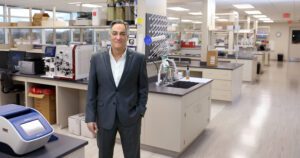
NIH Provides More than $1 Billion in 2022 Financing to Philadelphia Research Programs
By Alex Keown
March 28, 2023
More than $1 billion in National Institutes of Health financing fueled thousands of research projects across the Philadelphia region in 2022.
Over the course of last year, the NIH awarded approximately $2.19 billion in grants and contracts to recipients across Pennsylvania. The funds supported critical research and programming for companies, universities and other institutions across one of the nation’s top hubs for life sciences.
It is estimated that for every $1 the NIH awards, there is a corresponding $2.64 of economic activity. United for Medical Research estimated the total 2022 awards from the NIH in Pennsylvania directly supported 30,520 jobs and $5.58 billion in economic activity across the Keystone State.
Institutes and organizations in the Pennsylvania region that received NIH support include the University of Pennsylvania, Children’s Hospital of Philadelphia, Thomas Jefferson University, Temple University of the Commonwealth and more. BioBuzz takes a look at some of the top recipients.
In 2022, the University of Pennsylvania received $688,378,172 from the NIH. Those funds supported 1,350 different research projects. Among the U Penn programs supported by NIH grants last year include an award supporting the Penn Therapeutics Mechanisms research team and its Probe Enabled Activity Reporting (PEAR) development and discovery system. PEAR is designed to explore the proteome of tumor cells. It’s believed the discoveries have the potential to advance precision cancer medicine by enabling therapeutic development and validating novel concepts and methodologies.
Additional awards for university researchers include funding to foster a better understanding of neutrophils, a type of white blood cell, in the tumor microenvironment that has the potential to identify novel targets for precision cancer immunotherapies. Another NIH-backed program will evaluate a novel technology that harnesses CRISPR/Cas gene-editing tools to genomically record inputs from two signaling pathways in the developing zebrafish brain. Funds will also support research into the design of universal vaccines against highly mutating viruses, bacteria and cancer.
Children’s Hospital of Philadelphia received $154,733,483 in 2022 from the NIH. The grant money financed 302 programs last year. Studies that received funding include “microbiome of the airway and the risk for bronchopulmonary dysplasia in the lungs of extreme preterms;” the “effect of mitochondrial quality control of systemic inflammation and organ dysfunction in pediatric sepsis;” and a “Phase I trial of inhaled tobramycin in very preterm infants with bronchopulmonary dysplasia,” as well as others.
The NIH contributed financial support to 195 different programs at Thomas Jefferson University in 2022 with $79,730,972. Drexel University received $60,407,946 last year. Those funds backed 137 research projects. Also, the NIH awarded $76,361,825 to Temple University in support of 176 research projects.
Beyond universities, the NIH provided funds to the Wistar Institute, a non-profit organization focused on oncology, immunology, infectious disease and vaccine research. That organization received more than $46 million in support of 66 projects. Research that received 2022 NIH funding includes $2.6 million to study structural vaccinology guided development of a universal CoV vaccine that uses nucleic acid-delivered nanoparticles, as well as funds to define metabolic adaptations within the pDAC arid tumor environment and neoadjuvant immunotherapy approaches to early-stage melanoma.
Venatorx Pharmaceuticals, which is focused on developing novel anti-infectives to treat multi-drug-resistant bacterial infections, snagged $16 million in backing for eight research programs. The Malvern-based company secured financial support for research projects that include a $7.4 million grant for the development of therapeutic products for antibiotic resistant bacteria, $1 million for preclinical development of capsid assembly modulators for the treatment of chronic hepatitis B infection, and $1.4 million to establish a gram-negative permeation rule set leveraging a unique small molecule library.
NRG Oncology Foundation secured more than $26 million for four programs, including a more than $4 million grant for the support of a biospecimen bank. Research Institute of Fox Chase Cancer Center received more than $22 million to back 47 research programs.







